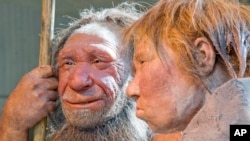Neanderthals - an extinct sub-species of humans - had a subtle genetic influence on modern humans. A study comparing Neanderthal DNA to the genes of people of European and Asian descent found that a host of illnesses, including depression and blood disorders, are expressed in humans, thanks to our ancient ancestors.
With modern technology, it is now possible to sequence the DNA of our distant Neanderthal cousins.
In a study comparing the genetic material of our closest extinct human relative to a genetic database of 28,000 people of Eurasian descent, scientists have confirmed the biological influence of modern humans’ ancient ancestors.
The DNA was passed down through the interbreeding of Neanderthals, who lived in what is today Europe and Asia, and early humans, who had migrated out of Africa.
As a result of that co-mingling, 40 to 60,000 years ago, say researchers, humans have inherited about two percent of their DNA from Neanderthals. Previously it was speculated that between one and four percent of our genetic material was derived from Neanderthals.
John Capra, the study’s lead author and a professor of biological sciences at Vanderbilt University in Nashville, Tennessee, says it appears that modern human health conditions - including disorders of the immune system, skin, neurological system as well as reproductive health - were indirectly influenced by Neanderthals.
Capra says the ancestral genes of early man also appear to have influenced the development of clinical depression, a serious psychiatric illness.
“What our results are saying is not that Neanderthals were depressed or that they are making us depressed. It’s that we find in modern environments the bits of DNA that we’ve inherited from Neanderthals are having an influence on these systems. And what that effect is remains to be seen but it’s certainly fascinating about why that might have been," said Capra.
The findings linking Neanderthal DNA to that of modern humans, by John Capra and colleagues, is published in the journal Science.
The researchers unveiled their work at the annual meeting of the American Association for the Advancement of Science.
This is the first direct comparison of Neanderthal DNA to that of modern humans. Capra says the genes probably conferred some environmental benefit to the extinct human sub-species.
He hopes that comparing it to the genetic profile of 21st century people might tell investigators how humans evolved and how the genes contributed to modern ailments.
“And while Neanderthal DNA has a significant influence on them or risk for them, it by no means dooms us to having those diseases," he said.
But Capra says that ancient DNA may have contributed to more physical traits that that are yet to be discovered.




